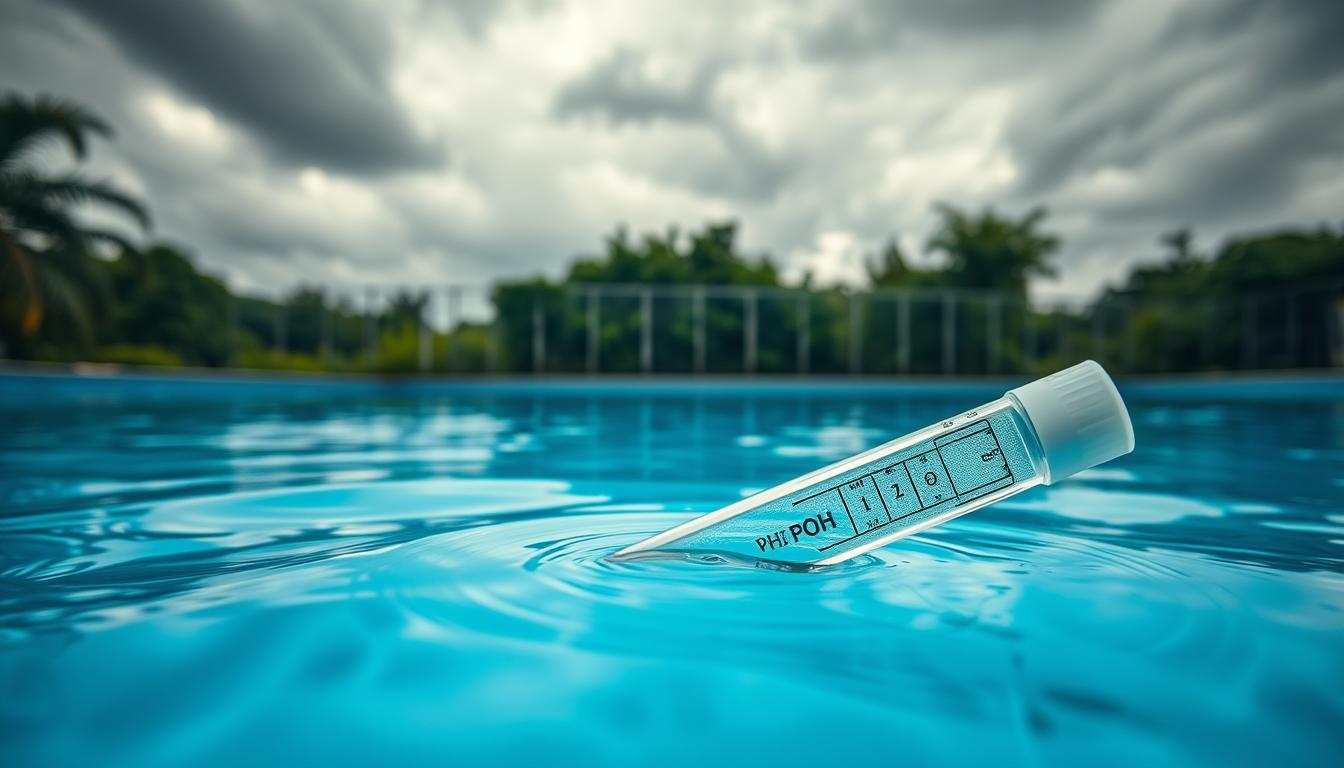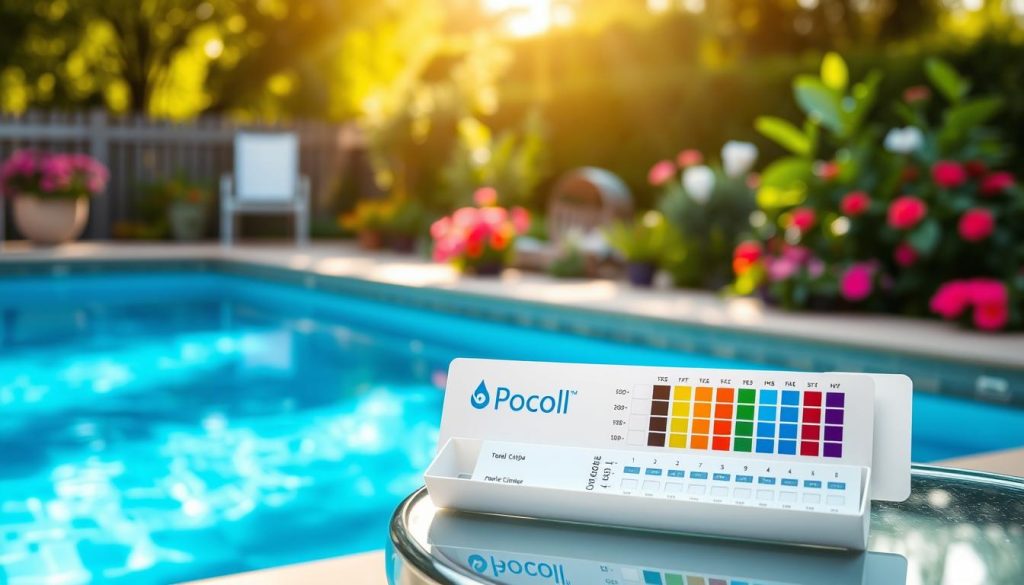
Pool owners often wonder how rain affects their backyard oasis. Surprisingly, rainwater can lower pH levels in your swimming pool. This can lead to various issues if not addressed promptly.
Imagine waking up to the sound of rain pattering against your window. While refreshing, it can disrupt your pool’s chemical balance. Rainwater typically falls below 7 on the pH scale, making it acidic.
This acidity can alter your pool water’s composition. It may become more corrosive, potentially damaging plaster surfaces and equipment. The effects go beyond mere looks.
When pH levels drop, the water becomes more acidic. This can erode plaster surfaces, causing stains and roughness. It may also reduce the lifespan of pool equipment.
Acidic water can irritate swimmers’ skin and eyes. It’s not just about comfort, but safety too. Rain also dilutes pool chemicals, making them less effective.
Chlorine and other sanitizers may struggle to kill bacteria and algae. In saltwater pools, heavy rainfall can reduce salt levels. This hinders the system’s ability to produce chlorine.
Key Takeaways
- Rainwater is naturally acidic, typically falling below 7 on the pH scale, which can lower pool pH levels.
- Acidic rainwater can make pool water more corrosive, potentially damaging plaster surfaces and equipment.
- Rainwater dilutes pool chemicals, reducing the effectiveness of chlorine and other sanitizers.
- Heavy rainfall can lower salt levels in saltwater pools, affecting the chlorination system.
- Monitoring and adjusting pool chemistry after rain is crucial for maintaining a clean and safe swimming environment.
The Science Behind Rain Water’s Impact on Pool Chemistry
Rainwater can upset your pool’s chemical balance. It brings dirt, dust, pollutants, and tiny life forms from the air. Rainwater is slightly acidic, with a pH of 5.0 to 5.5. This can change your pool water’s chemistry, affecting its clarity and safety.

Understanding the Acidic Nature of Rainwater
Rainwater’s acidity comes from dissolved carbon dioxide, which forms carbonic acid. Other air pollutants can also make rainwater acidic. When this enters your pool, it can lower the pH levels.
This pH shift can cause problems. It may corrode pool surfaces and equipment. It can irritate swimmers’ eyes and skin. It can also make chlorine less effective.
- Corrosion of pool surfaces and equipment
- Irritation to swimmers’ eyes and skin
- Reduced effectiveness of chlorine and other sanitizers
- Cloudy or murky water
Regular pool water testing is crucial. The ideal pH for a pool is 7.2 to 7.8. Keeping pH levels steady helps minimize rainwater’s impact on your pool.
How Rainwater Collects Contaminants and Affects Pool Balance
Falling rainwater picks up various contaminants. These can affect your pool’s chemical balance. Contaminants may include:
- Dirt and dust particles
- Pollen and other organic matter
- Microorganisms and bacteria
- Chemical pollutants from industrial and automotive emissions
These contaminants can increase total dissolved solids (TDS) in your pool. They can also change alkalinity and calcium hardness. High TDS can make water cloudy and reduce sanitizer efficiency.
Regular pool water testing is key. Adjust the chemical balance as needed to keep your pool clean and safe.
| Chemical Parameter | Ideal Range | Effect of Rainwater |
|---|---|---|
| pH | 7.2 – 7.8 | Lowers pH, making water more acidic |
| Alkalinity | 80 – 120 ppm | Can decrease alkalinity, leading to pH instability |
| Calcium Hardness | 200 – 400 ppm | May decrease calcium hardness, increasing the risk of corrosion |
| Chlorine | 1 – 3 ppm | Can dilute chlorine levels, reducing sanitizing effectiveness |
Knowing how rainwater affects pool chemistry is important. Test and adjust your pool water regularly. Use pool water treatment products as needed. This will keep your pool clean and safe, even during rainy seasons.
Effects of Rain on Pool Chemistry
Rain can upset your pool’s chemical balance. It affects pH, alkalinity, calcium hardness, and chlorine levels. Proper maintenance after rainfall keeps your pool safe and enjoyable.
Understanding these effects helps you maintain a top-notch swimming environment. Regular testing and adjustments are key to pool care.
Effects of Rainwater on pH Levels
Rainwater is acidic, with a pH of 4.3 to 6.2. This is lower than the ideal pool pH of 7.2 to 7.6.
When rain mixes with pool water, it lowers the overall pH. This can irritate swimmers’ skin and eyes. It may also corrode metal pool parts.
Test your pool water after rain. Adjust pH levels as needed for a safe swim.
Changes in Alkalinity and Calcium Hardness
Rainwater has very low alkalinity, sometimes zero. This can cause rapid pH changes in your pool. Low alkalinity leads to an unstable pool environment.
Rain also dilutes calcium hardness levels. Calcium prevents corrosion and maintains pool structure. Test and adjust these levels after rainfall.
Impact on Chlorine Levels and Saltwater Pools
Rain dilutes chlorine in your pool. This reduces its ability to sanitize and prevent algae growth. You may need to add more chlorine after rain.
In saltwater pools, rain lowers salt concentration. This affects the chlorination system. Monitor and adjust salt levels to ensure proper sanitation.
| Pool Chemistry Component | Ideal Range | Effects of Rain |
|---|---|---|
| pH | 7.2 – 7.6 | Lowers pH levels |
| Alkalinity | 80 – 120 ppm | Lowers alkalinity levels |
| Calcium Hardness | 200 – 400 ppm | Dilutes calcium levels |
| Chlorine | 1 – 3 ppm | Dilutes chlorine levels |
Regular pool maintenance is crucial after heavy rainfall. Test water frequently and adjust chemical levels as needed. This ensures a healthy, safe pool for everyone to enjoy.
Conclusion
Rain can significantly impact pool water balance. It alters pH levels and introduces contaminants, disrupting the chemical equilibrium. By following maintenance tips and regularly testing water chemistry, we can minimize rain’s effects on pools.
Pool maintenance involves more than balancing chemicals. A high-quality pool cover protects against excessive rainfall and debris. Regular skimming, vacuuming, and proper drainage are crucial, especially after heavy rainstorms.
These steps prevent issues like overflow, flooding, and structural damage. Maintaining healthy water balance and consistent maintenance are essential for pool enjoyment. Promptly addressing water chemistry changes ensures a safe and inviting oasis.
With the right tools and knowledge, we can keep pools crystal-clear. Regular care helps maintain smooth operation in all weather conditions. Dedication to proper maintenance ensures a enjoyable pool experience for everyone.







